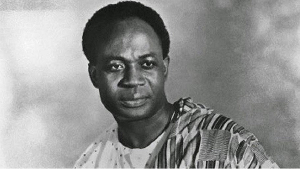This article explores the pivotal role of Dr. Kwame Nkrumah in Ghana's quest for independence, highlighting his leadership within the United Gold Coast Convention (UGCC) and his subsequent formation of the Convention People’s Party (CPP). Despite facing imprisonment, Nkrumah's relentless pursuit of freedom led to his election as Ghana's first Prime Minister and later as its first President.
His visionary policies and initiatives laid the groundwork for Ghana's political economic, and social development transforming it into a stable and democratic nation.
The article also examines the opposition Nkrumah faced from fellow UGCC leaders and other prominent figures, emphasizing the complexities of Ghana's independence movement. By delving into the life and contributions of Kwame Nkrumah, the article underscores his enduring legacy as the true founder of modern Ghana.
Dr. Kwame Nkrumah, alongside Dr. Joseph Boakye Danquah, Ebenezer Ako-Adjei, Edward Akufo-Addo, Emmanuel Obetsebi-Lamptey, and William Ofori Atta, were key leaders in the United Gold Coast Convention (UGCC), founded in 1947. Among them, it was Nkrumah who stood out as the driving force behind Ghana's push for independence. After his studies abroad, Nkrumah established the Convention People’s Party (CPP) in 1949, which quickly became the dominant nationalist movement in the country.
Nkrumah faced imprisonment due to a misunderstanding related to a strike organized by his party, leading to a three-year sentence at Fort James prison in Accra. Despite his incarceration, he achieved a landslide victory in 1951, resulting in his release on February 12. Nkrumah then became Ghana's first Prime Minister. His pivotal role in Ghana’s founding was further solidified by his efforts in shaping the new nation.
As Prime Minister and later as the first President, he introduced numerous policies and initiatives that established the foundation for Ghana's political, economic, and social development, transforming it into one of the most democratic and economically stable countries in Africa.
Dr. Nkrumah was crucial in establishing Ghana's systems of governance, including its political structure and constitution, which remain cornerstones of modern Ghana. While Dr. Joseph Boakye Danquah, Ebenezer Ako-Adjei, Edward Akufo-Addo, Emmanuel Obetsebi-Lamptey, and William Ofori Atta also viewed themselves as "founding fathers," the title is primarily attributed to Nkrumah, who led Ghana to independence from the United Kingdom on March 6, 1957.
The UGCC leaders often opposed Nkrumah and the idea of full independence in 1957. They did not form a cohesive front but instead held divergent views on various issues. The Ghana Congress Party (GCP), an opposition party under the 1951 constitution and a faction of the UGCC, advocated for a semi-autonomous state rather than the unitary republic that Ghana eventually became.
Their differing opinions and lack of unity posed a threat to the country's cohesion. Historical evidence shows that many opposed Ghana's independence in 1957. Dr. J.B. Danquah, a founding member of the UGCC, wrote a letter on October 10, 1951, to J.A. Obdam in London, rejecting Nkrumah's call for immediate independence from British rule. In his letter, titled "Nkrumah and His Tricks," Danquah characterized Nkrumah's demand for immediate independence as an incitement to criminal conspiracy against law and order.
In 1960, Danquah ran against Nkrumah for the presidency but was defeated. He grew increasingly resentful, and he was arrested in 1961. Although released later that year, Danquah continued his opposition, which led to his re-arrest in 1964 for plotting to overthrow Nkrumah. He died of a heart attack while detained at Nsawam Medium Prison on February 4, 1965.
Other prominent figures, such as Ako Adjei, Edward Akufo-Addo, and William Ofori Atta, also opposed Nkrumah. Ako Adjei, a former minister in the CPP, challenged Nkrumah but was eventually jailed. Edward Akufo-Addo was arrested following an attack on Nkrumah but later became Chief Justice and head of the National Liberation Council. Ofori Atta, a founding member of the UGCC, opposed Nkrumah's government and was detained under the Preventive Detention Act.
Moreover, Dr. Kofi Abrefa Busia, a historian who later served as Prime Minister from 1969 to 1972, opposed Ghana's independence. He petitioned the British government, arguing that Ghana was not ready for independence and still required British administration.
Understanding the life and contributions of Kwame Nkrumah is essential for comprehending the foundations of Ghana's government and its ideals of independence. Nkrumah distilled years of enlightened thought into a form of government that aimed to limit central power, protect citizens' rights, and ensure governance with the consent of the people. His legacy and ideals continue to influence Ghanaian society and politics, establishing him as a pivotal figure in the country's history and development.
Opinions of Wednesday, 7 August 2024
Columnist: Edinam K. Glover















